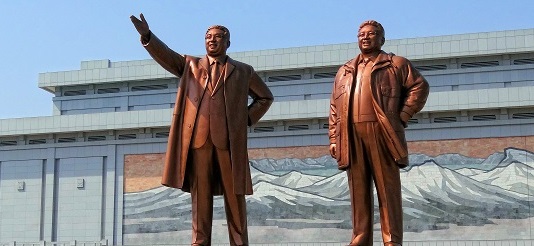US increases pressure on North Korea
March 24, 2019 | Expert Insights

The US has sanctioned Chinese companies over trade with North Korea in order to pressure the beleaguered nation, while simultaneously sending a message about the seriousness of its sanction regime.
Background
Political and diplomatic relations between North Korea and the United States have been historically hostile, developing primarily during the Korean War in the 1950s. In recent years, relations have been largely defined by North Korea's belligerent nuclear program – testing of nuclear weapons, development of long-range missiles capable of striking targets thousands of miles away, and ongoing threats to strike the United States and South Korea.
The US and the UN have placed tough economic penalties on North Korea. Around 90% of its exports are banned including coal, iron ore, seafood and textiles. There are also caps on the amount of oil it can buy. If Kim Jong-un is going to build up his economy as he has promised his people, then he will need the sanctions lifted. The US has underlined that there will be no sanctions relief until "complete denuclearisation.”
Since January 2018, North Korea has appeared to have softened its stance, initiating diplomatic meetings. US President Donald Trump’s propensity to seek deals has allowed the US to approach the negotiating table. However, several rounds of negotiations have resulted in no progress, with the latest US-North Korea summit in Singapore yielding the same outcome. The February summit broke down over demands by North Korea for relief from sanctions and demands from the US for Pyongyang to give up its nuclear and ballistic missile programs.
Analysis
On March 21, 2019, the United States imposed sanctions on two Chinese shipping companies that it claims helped North Korea evade existing sanctions pertaining to its nuclear weapons program. The newly sanctioned firms are Dalian Haibo International Freight Company Limited and Liaoning Danxing International Forwarding Company Limited. The US holds that Dalian Haibo was sanctioned for trading with Paeksol Trading Corporation, a company already sanctioned under the existing regime. Dalian Haibo, it claims, traded in early 2018 using North Korean-flagged vessels. Liaoning Danxing, the statement says, “routinely used deceptive practices” that facilitate North Korean tactics used by officials working out of Europe. These side-stepping tactics include disabling or altering automated identification systems, physically manipulating vessels, transferring cargo between ships and fabricating documentation.
The move comes three weeks after the second meeting between President Trump and North Korean leader Kim Jong Un broke down. Treasury Secretary Steven Mnuchin said in a statement, “Treasury will continue to enforce our sanctions, and we are making it explicitly clear that shipping companies employing deceptive tactics to mask illicit trade with North Korea expose themselves to great risk.” A senior US official stated that the latest round of sanctions is evidence of some “leakage” by China, although Beijing continued to stand by UN resolutions. The official also asserted that the sanctions were not aimed at escalating US pressure on North Korea, but rather to maintain the current sanctions regime.
US Secretary of State Mike Pompeo said that the following weeks may see a team of negotiators sent to North Korea for talks. The move highlights Washington’s intention to continue to engage in negotiating with the wayward state. North Korea has warned that it is weighing the suspension of talks and may re-evaluate the freeze on tests instituted since 2017 unless the US is willing to meet some of its demands. On March 18, 2019, two US senators called for more sanctions to be instituted against North Korea based on a 2019 UN report that showed that North Korea continued to defy sanctions.
The sanctions of March 21 are aimed at increasing pressure against North Korea, although it institutes sanctions for an infraction incurred in 2018. The delayed reaction by the US indicates a desire by the US to assuage North Korean fears of further sanctions on its entities, a position augmented by sanctions being placed against Chinese companies. The move is to increase pressure without severely exacerbating North Korean living conditions ahead of another potential round of negotiations.
Assessment
Our assessment is that the March 21 sanctions are aimed at increasing pressure on North Korea in light of another round of potential negotiating, while simultaneously sending a message to organisations worldwide that the US takes the sanctions seriously. We believe that instituting sanctions against Chinese organisations also sends a message to China that the US will not hesitate to sanction a country that it has been increasingly at odds with, which is also North Korea’s largest trade partner.
Image Courtesy: https://upload.wikimedia.org/wikipedia/commons/3/36/Mansudae-Monument-Bow-2014.jpg, Bjørn Christian Tørrissen [CC BY-SA 3.0 (https://creativecommons.org/licenses/by-sa/3.0)]








Comments